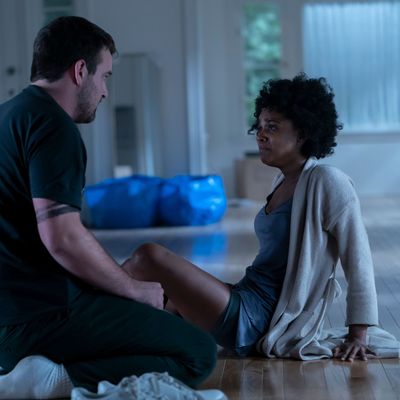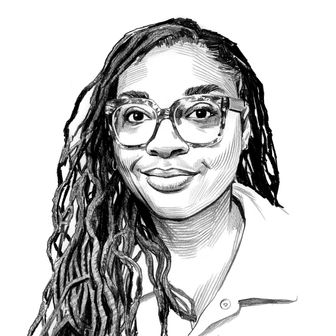
From the first few frames, Branden Jacobs-Jenkins’s adaptation of Kindred begins with undeniable terror. Our protagonist, Dana, is face down on the floor screaming before slowly bringing herself to her feet with the primal movements of a wounded animal.
The exaggerated horror elements of the series shouldn’t have surprised me, but in many ways it did. I attribute this to the fact that I was initially introduced to Kindred as an adult scholar of Black studies — the novel felt more like historical fiction than anything. Yes, the terrors of slavery and the inherent fearfulness of Dana’s supernatural situation provide the tempo and energy of a thriller, but something about the writing is so vividly real and ancestral I would never describe the book as scary. But this episode? Frightening. And this is just the beginning; the menacing music, combined with the cool, dark colors and the terrifying scream from the woman Dana meets during her first visit in the past, is nothing compared with the horrors we’ll see as Dana becomes more and more enmeshed in antebellum Maryland.
Genre plays an integral part in the storytelling of Octavia Butler’s best-known novel. Butler uses sci-fi, the genre she pioneered for many Black writers, as a vehicle to explore slavery and its impact outside the stark confines of American history. By transplanting a modern Black woman onto the functioning plantation of her ancestors, Butler juxtaposes the reality of slavery with the muddy memory we have of it in the present. However, sci-fi is an insufficient label for a work such as Kindred. The novel is historical fiction, science fiction, and horror all in one. The epitome of genre bending, Kindred’s capability to transcend any particular category makes it an obvious candidate for the screen.
The series starts much like the book — we’re thrown headfirst into the story, meeting Dana after she returns from one of her journeys in the past. The Dana of Jenkins’s television version of Kindred just moved to Los Angeles from New York after selling the townhouse she inherited with the hopes of breaking into TV writing. Shortly after the move, she goes on a date with Kevin, a white waiter she meets while dining with her aunt and uncle. By the end of the night, Dana finds herself shuttled between 2016 and the early 1800s numerous times with only Kevin witnessing her abrupt vanishing. Through a power she’s unaware of, Dana time travels to the Weylin plantation, where she finds her mother, Olivia, a woman she was told died in a car crash. The cause of this time-traveling is unclear, but Dana must quickly adapt to survive.
The idea for Kindred was birthed from a comment Butler heard during her time at Pasadena City College. A young Black man involved in the budding Black Power Movement said, “I’d like to kill all these old people who have been holding us back for so long. But I can’t because I’d have to start with my own parents.” In an interview for Callaloo, a literary magazine focusing on the African diaspora, she says this comment stuck with her for 30 years. She wanted to counter these feelings by providing a first-person account of the true evils of slavery that displayed how much Black people have endured. If we knew exactly how those who came before us suffered, we would give them more grace and respect. We wouldn’t view their actions as passive or weak. But how does one evoke the visceral and painfully real emotions of autobiographical slave narratives like The Interesting Narrative of the Life of Olaudah Equiano or Frederick Douglass’s acclaimed memoirs for the modern reader?
You could simply create a protagonist and a fictional story about the horrors of slavery, but the problem with this is that collective memory is especially fickle regarding race. American history has always been skewed to favor those in power. Not only has our white-dominated society taught us that the worst of racism is behind us, but we’re also taught a flattened and softened version of the truth. This indoctrination places a disproportionately large amount of space between modern society and slavery, making it even harder for both Black and white Americans to relate to their ancestors. This disconnect can make engaging with content about slavery feels as real as watching Game of Thrones or Bridgerton. But in terms of the sociological, psychological, and economic repercussions of the trans-Atlantic slave trade, we’re not as far removed as we believe. Time travel is the perfect device to reflect how the rippling effects of racism and the deliberate attempts to deny them leave us stuck in the past in more ways than we’re conscious of.
These concepts are especially timely as there’s been a popular sentiment bubbling among Black viewers: People are sick of trauma porn. There’s a valid argument behind this feeling; in a world where not enough Black stories are told, viewers rightfully want to see the full spectrum of the Black experience represented. This makes it a tricky time to adapt Kindred, and the first episode has the daunting task of drawing people in enough to keep watching. The sci-fi aspect of Kindred was revolutionary in the 1970s, but in 2022, with projects such as Antebellum and Lovecraft Country, it’s less of a selling point. The series is more compelling by leaning into the horror elements and having Dana’s mother stuck in the past. Still, life on the plantation in this episode is redundantly similar to other Hollywood depictions of slavery.
When Dana first arrives on the Weylin plantation, she opens her eyes to find herself in a dark room as a woman checks on a baby in a crib. The woman, who turns out to be Olivia, leaves, and Dana goes to the crib and finds a baby lying face down on his stomach, slowly suffocating. The second time Dana arrives in 1815, the same boy, now years older, is drowning in a river. She saves him again. The third time, she saves the boy from a fire in the house. By this time, Rufus, the little boy, recognizes Dana. When he comes to consciousness, he calls her a haint and says, “You’re that nigger that haunts our land.” Before Rufus’ father makes his way to the two, Dana runs into the forest. She bumps into Tom, who is enslaved on the plantation, and also recognizes her. He directs her to Olivia but not before asking, “are you an angel or something else?”
On the way to Olivia, she runs into a slave patroller. He mistakes her for someone named Hagar and lets her go, making a pass at her as she leaves. Once she gets to her destination, a small cabin in the woods, she meets the real Hagar and finds Olivia. Olivia asks her daughter how she’s been able to travel back and forth in time, as she hasn’t been able to, but is frustrated when Dana doesn’t know. Olivia also reveals that she, just like Dana, was 26 years old when she first traveled to this time. She then asks about Dana’s father. Dana says she thought they both died in the same car crash. This comes as a revelation to Olivia, whose response suggests she believed Dana’s father was still alive. Their reunion ends when they hear Hagar screaming outside. The slave patroller is assaulting Hagar, thinking he saw her twice in one night. He starts to assault Dana after she tries to run away. He beats her and begins to choke her when Olivia hits him over the head with a rock, and Dana comes back to her modern reality. Screaming, she scratches at Kevin, who was standing over her, until she realizes she’s home.
This episode is divided pretty evenly between past and present, so it’s hard to calculate just how realistic the depictions of slavery will get. However, from what we have seen on the plantation, there’s little that makes slavery seem any more graphic or gut-wrenching than in any other series or movie. The directing and acting make it a pretty good episode, but it didn’t captivate me as quickly as the book did. I know it’s only the first episode, but there isn’t a sense of urgency or desperation from those who are enslaved … at least not yet. The slave patroller’s assault was indicative of the violence experienced during that time but pretty tame when compared to real stories of the skin of my ancestors being used to make leather. Whether these atrocities are still to come, I can’t say, but what we’ve seen so far isn’t taking things to that level. It feels strange and perverse to hope for that kind of representation, but that’s the precise reason Butler wrote the book. And it’s the only way the series can meaningfully set itself apart amid a sea of similar content.
Time-Traveler Diaries
• Two significant deviations from the book are introduced in this episode: (1) In the novel, Dana’s parents are barely mentioned. We know only that her mother was a teacher who died in a car crash as opposed to someone who was possibly mentally ill. This ups the stakes for Dana versus in the book, where she’s connected to the people on the plantation only distantly. (2) In Butler’s writing, Dana was originally married to Kevin for at least four years when she had her first time-traveling episode. Having Kevin be a new person in her life may impact the depths of her trust and loyalty.
• Speaking of Kevin, this isn’t terribly important, but — and no shade to the actor — I was expecting a much more debonair onscreen depiction. In the book, Kevin was giving very much silver-fox vibes, not whatever is going on here.
• Also, during their date, Kevin turns on a song by the Black British 1970s funk band Cymande … a song that was actually featured in Spike Lee’s Crooklyn. A little too on the nose for me; I hate when white people try to subtly flex their knowledge of Black culture — something that happens a lot whenever white men try to court me. But his appreciation of Black culture will definitely impact him as he inevitably confronts his own whiteness, and I’m interested to see how that manifests.
This recap has been updated.


